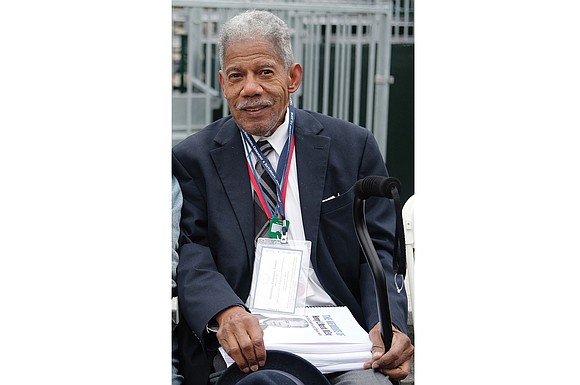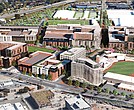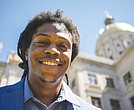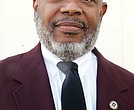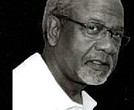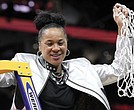Henry L. Marsh III to introduce his memoir
Jeremy M. Lazarus | 3/22/2018, 6:46 p.m.
He had his sights set on making his living as a truck driver.
Then Henry L. Marsh III went with a group of high school buddies to hear a school desegregation case in Richmond, and that experience changed his life.
In his soon-to-be released memoir, Mr. Marsh describes how he listened enthralled to the arguments of two Richmond legal greats, future law partner Oliver W. Hill Sr. and future federal Judge Spottswood W. Robinson III.
“I liked the way they handled themselves and how the judges respected them,” Mr. Marsh recalls. “I didn’t understand all that they were saying, but … when I saw what (they) were trying to do, I was impressed.”
Then and there, he writes that he decided he, too, wanted to be a lawyer to “help make positive change happen.”
Nearly 60 years later, the soft-spoken 84-year-old Mr. Marsh is using his pen to take a walk back through the history he helped create as an attorney on the front lines of the legal wars for civil rights and as a longtime public official, including his rise to become the first African-American mayor of Richmond and service in the Virginia Senate.
Mr. Marsh provided the Free Press with an advance copy of “The Memoirs of Hon. Henry L. Marsh III: Civil Rights Champion, Public Servant, Lawyer” in which he offers anecdotes and memories of the role and he others had in attacking government-enforced and business-condoned segregation. He dedicated the book to his wife, Diane Harris Marsh, a former dentist.
Mr. Marsh is scheduled to introduce his 232-page memoir 4 p.m. Monday, March 26, at an event the University of Richmond’s Black Law Student Association is hosting at the Law School.
His book adds to the literature now focusing attention on the role African-American attorneys in Virginia played in dismantling legal barriers to equality. Much of Mr. Marsh’s book focuses on his work with Hill, Tucker & Marsh, the law firm he as a newly minted lawyer helped create with Mr. Hill and attorney Samuel W. Tucker.
The firm, which would produce at least 10 future judges, was a bulldog on civil rights, recounts Mr. Marsh, a Virginia Union University graduate who earned his law degree at Howard University.
Mr. Marsh states that one reason for the firms’ activity was its willingness sue local school boards for engaging in Massive Resistance to desegregating public schools as required in the famed 1954 Brown v. Board of Education case.
“We were constantly fighting against race prejudice,” he recalls. “For instance, in the case of Franklin v. Giles County, local official fired all of the black public school teachers. We sued and got the (that) decision overruled.”
Mr. Marsh recalls fighting the Norfolk School Board for at least 20 years and the firm’s victory in Green v. New Kent County in 1968, when the U.S. Supreme Court told school boards in Virginia and across the country that it would no longer tolerate delay in desegregating schools.
The firm also was engaged on a host of other fronts, ranging from housing and voting rights to employment issues.
Among the cases Mr. Marsh is most proud of is a lawsuit against tobacco giant Philip Morris that forced the company to eliminate seniority rules that blocked the hiring and promotion of African-Americans to better paying jobs.
While he and his partners fought in the courts, Mr. Marsh also began a political career. He had gotten a taste for politics in 1965 in lobbying for passage of the 1965 Voting Rights Act.
In some ways, his entry was accidental. He writes that he first sought to recruit others to run for City Council in 1966. While there already were two African-Americans on the council, Mr. Marsh writes that he believed additional representation was needed.
“I was running all over the state litigating,” he states. But after being turned down by others, “I finally decided to run myself. I thought, ‘I’ll do it for two years.’ ” He ended up serving on council for 25 years.
In his book, Mr. Marsh paints himself more as the mild-mannered diplomat than a civil rights firebrand, more focused on getting something done than fomenting marches and protests.
In 1977, he was elected mayor when African-Americans achieved a five-seat majority on City Council once a district system had replaced at-large elections. His book does not mention Roy West, the African-American educator who later ousted him as mayor or those who dubbed him “King Henry” for his deft control of the majority.
The book does discuss the controversy that ensued when the new majority fired the white city manager, William Leidinger, and hired the city’s first African-American city manager, Manuel Deese.
He spends more time on his efforts to bridge the city’s racial divide. He writes about the relationship he built with Dominion Virginia Power leader T. Justin Moore Jr. that led to the creation of the biracial, public-private Richmond Renaissance — now Venture Richmond.
“Justin Moore and I felt we had to exercise some constructive leadership and do something. We and other like-minded individuals who supported a cooperative vision persevered. Together, we wound up making progress.”
Mr. Marsh worked on his memoir with a team of friends and two editors, University of Richmond law professor Jonathan K. Stubbs, who help produce Mr. Hill’s autobiography, “The Big Bang,” and University of Virginia doctoral student Danielle Wingfield-Smith, whose dissertation focuses on Mr. Marsh and others involved in school desegregation.

